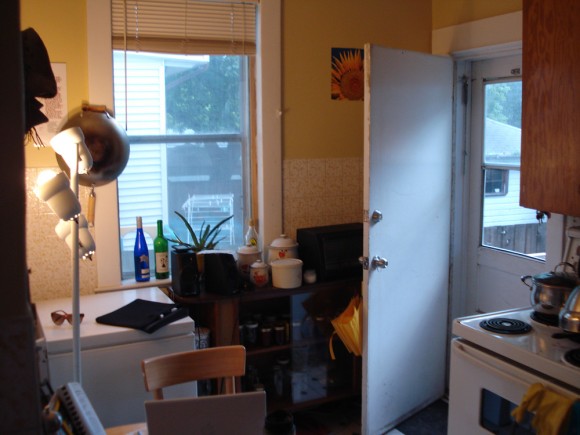Loaded space

The following is a guest blog entry from Geez board member and former staffer, Mya Wheeler Wiens. She’s currently doing graduate studies in natural resource management at the University of Manitoba. In Geez Issue No. 3, we looked at how we design our spaces. In the near future we’ll do an issue on how we are affected by the places which surround us. This happens to be the focus of Mya’s thesis.
Over cups of coffee, my soon-to-be thesis advisor wanted to help me select a topic. “So Mya, what are you interested in?” he asked.
Of course, I’d been thinking about this and was prepared to answer.
“Well, I’m interested in how people connect intimately with places. For example, by knowing where the food they eat comes from,” I said. “Essentially, I’d like to explore how people are connected to places.”
A year later, I am in Kenora, Ontario, a small city on the western edge of Canada’s boreal forest, 200 kilometres from home (or at least my most recent home). I’m surrounded by writings on space and sense of place. I still wake up astonished and humbled by what can happen when you follow your curiosity.
It seems I’m finding references to “place” everywhere. Here are a few snippets of my early findings:
Poet Mary Oliver constantly investigates the importance of place, and of being re-enchanted with place. Her poems observe egrets in flight, sit at “Five A.M. in the pinewoods,” and listen as the wild geese are “over and over announcing your place/ in the family of things.”
Another poet, Rowan Williams asks, “Why are places not neutral?” in a poem entitled, “Return Journey.” The answer is an exploration into the power of the past to shape our experiences. He says, “so it is not the future/ but the past we know to be incredible,/ eluding the imagination: unmoved mover…”
Arturo Escobar is an academic who studies the political conflict and struggle of minority people in Columbia. He begins a chapter on place with a poem by the Colombian writer, Jaime Rivas. It ends, “Aqui el agua tiene sabor a nosotros/ The water here tastes like us.” Place, according to Escobar, is hope against the powers of colonization and globalization that threaten identity.
Doreen Massey, a feminist geographer, explores how places are alive. She sees how they are formed by our crossing and interaction, and are therefore adaptable. She responds to the concept of placelessness, the thinning connection between people and place. It’s a painful process, etching away a sense of belonging.
I am excited by the concept of “contested space,” or how places can contain or prohibit multiple meanings. For example, consider your city park: How do you know it is a park? What sort of activities are considered appropriate there as a public space? A family picnic, a hang-out for kids, a good place to walk the dog? How about a home? What if someone put a tent there or fenced in a section? What if the city sold the land to a developer and they built a mall? A single geographic place can have so many meanings and perspectives.
I think most of the time we take for granted those places that contain the work of our daily lives. My partner, Josh, and I recently moved out of our home of two years, causing us to reflect deeply – especially considering my topic of study – on the nature of our home place. The different ways we had arranged the furniture, the hours we spent in our kitchen, the way the light came in the windows at different times of the day. Will the walls hold our memories like a sponge? What have we gained, changed, left behind? For example, the walls are painted blue, green, and yellow – colours that I chose, that my mother-in-law helped me paint. The stove top is scratched from much use and there are memories, ours and our friends/family, that will always be connected to that kitchen and the food made and eaten there.
Rainer Maria Rilke’s voice, haunting and stern, cautions me by saying, “for here there is no place that does not see you. You must change your life.” I understand this to mean that here, when you begin to engage, all places begin to engage with you, or in Rilke’s words, “see you.” Instead of remaining an inactive bystander, you become present to the place.
Mya Wheeler Wiens is a member of the board for Geez magazine.


Sorry, comments are closed.